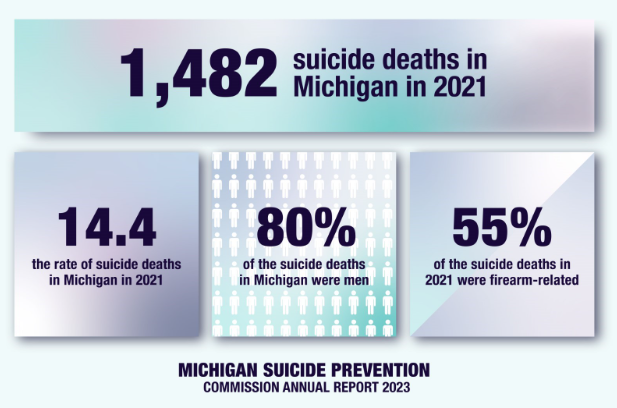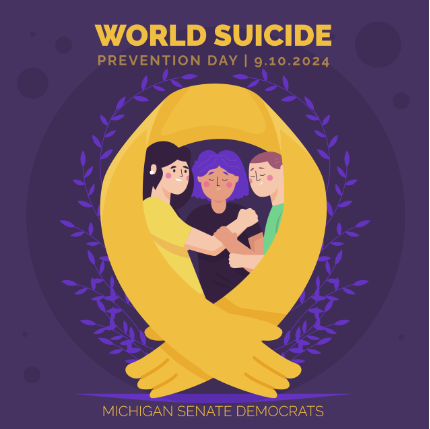About every 11 minutes, someone dies by suicide in the United States.
In Michigan, it’s the 11th leading cause of death. According to the Michigan Suicide Prevention Commission’s 2023 annual report, 1,482 people lost their lives to suicide in 2021. Of those, 80% were men, and 55% of all suicide deaths involved firearms.

These numbers underscore a devastating reality that is already known and felt by too many Michiganders and people across the country — this is a serious public health problem.
That’s why this month is so important. Every year, September is recognized as National Suicide Prevention Month, and earlier this week, Senate Democrats designated this month as Suicide Prevention Month here in Michigan as well. On September 10th, people around the globe commemorated this issue on World Suicide Prevention Day as well. These recognitions shine a much-needed light on this growing issue that, due to widespread stigma around the subject, has remained in the dark for too long.
Sen. Rosemary Bayer speaks on the floor of the Senate chamber regarding the impact of suicide on her life and her resolution to reduce stigma and prevent suicide.
This month reminds us that it’s OK to talk about suicide. In fact, we should talk about it. Discussing suicide and reducing the stigma that surrounds it goes hand-in-hand with prevention. And, research shows us just that: suicide can be prevented.
Suicide is also complicated and like any complex issue, requires a comprehensive approach. While people of all ages and backgrounds are affected by suicide, we must acknowledge those groups who are disproportionately impacted. From racism and discrimination to economic hardship and barriers to healthcare access to occupational stress and trauma, there are many factors that increase risk of suicide among certain groups of people, such as veterans, first responders, sexual and gender minorities, people who live in rural areas, middle-aged adults, people of color, and tribal populations.
Fortunately, there has been a growing cultural shift towards understanding and prioritizing the importance of mental health, arguably intensified by the COVID-19 pandemic. A growing number of people are now recognizing the importance of mental health in conjunction with physical health and that indeed, mental health is as crucial as physical health.
Increasing awareness of mental health helps us to understand the subject of suicide, as it is generally acknowledged that 90% of those who died by suicide had a diagnosable mental health condition at the time of their death.
Senate Democrats understand the complexity of the issue and since assuming the Majority last year, have taken a holistic approach to improve mental health outcomes and decrease suicide rates across the state. From passing legislation that ensures mental health is treated with the same importance as physical health to making meaningful investments in the well-being of Michiganders, Senate Democrats are committed to addressing this issue from all angles. While we’ve taken many positive steps in the right direction, we’re not finished yet.

Get Help: Hope is Possible
Call or text 988: If you need someone to talk to, are experiencing feelings of depression or anxiety, or are worried about a loved one’s mental health, call or text 988 and speak to trained crisis counselors who will help you get the support you need. This line is free, confidential, and available 24/7.|
Veterans Crisis Line: Send a text to 838255 or chat online
Support for LGBTQ+ youth: Trained counselors with The Trevor Project understand the challenges LGBTQ+ young people face and are available to text, chat, or call 24/7.
For mental and substance use disorders: Call the free, confidential, 24/7 Substance Abuse and Mental Health Services Administration (SAMHSA) National Hotline for treatment referral and information service: 1-800-622-HELP.
In addition to these free resources above, you can also visit your:
- Primary care provider
- Local psychiatric hospital
- Local walk-in clinic
- Local emergency department
- Local urgent care center
What you can do to help prevent suicide
Learn the risk factors and warning signs: While there is no single cause for suicide, there are many risk factors and warning signs that may increase someone’s attempt. Some health-related risk factors include mental health conditions such as depression, substance use problems, bipolar disorder, and more. Some warning signs include a person talking about killing themselves, feeling hopeless and trapped, etc. Behaviors that may signal risk include increased use of alcohol or drugs, isolating from family and friends, sleeping too much or too little, and withdrawing from activities. Moods that may signal risk include anxiety, irritability, loss of interest, humiliation, and shame. To view the full list of risk factors and warning signs, click here.
Talk about it: Suicide is a difficult topic for many to broach, but it takes exactly that — talking — to help prevent suicide. If you are afraid or uncertain of how to discuss this subject, check out the American Foundation for Suicide Prevention’s “Talk Away the Dark” campaign materials, which include conversation starters, how to have a healing conversation, and more.
Advocate for suicide prevention: From gun safety legislation to increasing access to mental health care, there are many ways you can help save lives through public policy. Join other advocates in pushing for suicide prevention policies at the state and federal levels.
